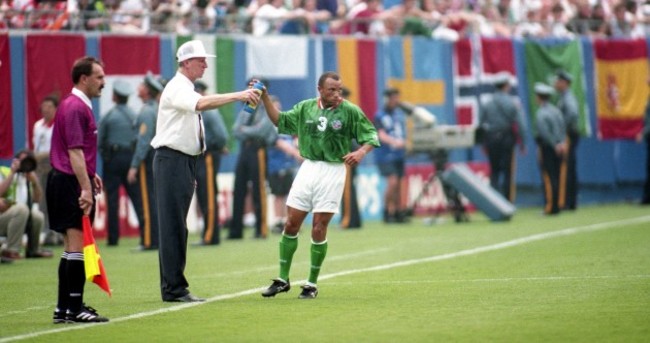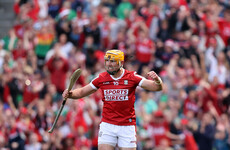LAST UPDATE | 17 Jul 2020
TERRY PHELAN COULDN’T believe it when he got his first Ireland call-up. Literally.
At the time, he was part of ‘the Crazy Gang’, a notorious Wimbledon side where dressing room pranks were commonplace. Clothes would be cut up or set on fire, cars would be ruined, it was a unique place to be.
Amid that environment, it was perhaps no surprise that Phelan assumed he was on the receiving end of another practical joke when he got a call and the person orn the other end of the line — who was in fact Ireland assistant boss Maurice Setters — told him of the news.
“If you didn’t get back to them, he had other players. He was very loyal to the players.
“I couldn’t believe it really. It was just out of the blue.
I said Vinnie [Jones], Dennis [Wise], stop messing about. I put the phone down three times. He called again and said: ‘If you put the phone down the next time, that is it, you won’t play for Ireland.’ So I didn’t put the phone down and I listened to what he had to say. He said: ‘Listen, we’re getting you a flight the next day, you’re coming to join the Irish team. We’ve got injuries. This was on a Monday, we were playing Hungary on a Wednesday. He said: ‘You’re likely to play.’ That was it. Nothing else.”
Phelan has been thinking about Charlton these past few days, after the Irish legend’s death at the age of 85 was announced at the weekend.
“We knew Jack wasn’t in the greatest of health. We saw him the September before last. He looked in good spirits then. He was up and about. He was laughing and joking. We had a big gala dinner for him. He was fine with his family.
“It’s very sad news. A true gentleman. A hard gentleman on the field when he played for Leeds and hard taskmaster off the field when we played for the Republic of Ireland, because he wanted us to do well for the country. He said: ‘If you do well for this country, you’ll be legends for the rest of your lives.’ I’d say he put not just football, but Irish sport on the map, a little country of four million.
“He brought hope to the Irish people. He gave them something to smile about, to cheer about — young, middle-aged, old people.
“And the place used to stop when we came into town. On training days and especially on the match days, that two o’clock kick-off at Lansdowne Road, the city used to stop. That’s the stature of what he built. It was a family he built — that’s the way it was.”
‘Family’ is a word that comes up when you speak to a number of former internationals from that era. It is perhaps a key reason behind the team’s success, the sense of camaraderie Charlton helped create among the players.
Niall Quinn once remarked: “It was like a club and like many clubs, when you got in the Irish team, as [Tony] Cascarino famously said, it was even harder to get out of it. He played until he was about 38.”
Phelan was first called up at the age of 24. By then, he had a few years of English top-flight football under his belt and had helped Wimbledon stun Liverpool in the 1988 FA Cup final. But the quality of full-backs available to Charlton meant the talented star — who Man City would end up buying in 1992 for £2.5 million in a move that equalled the British record transfer fee for a defender — had to bide his time.
“I got on a plane, we used to stay at the airport hotel,” he recalls. “I didn’t know where I was going. You’re always nervous anyway.
“I walked into the dining room and the first person that came up to me was Jack. He had a big smile, he took his cap off, brushed his hair to the side and said: ‘Wee man, come here. How’s Wimbledon? Sit down.’
“I sat down at his table. His wife and son were there. And he just started talking about Wimbledon. He said: ‘You’ve got a good chance up there. Just do well for me and you’ll be in the team. We’ve been watching you.’
“I’d come through the ranks from the [Ireland] youth team all the way right up, so that was my next step. The big man himself gave me a cap that first day. I was ever so proud. I wouldn’t have cared if it was one cap or 500 caps. One cap was better than nothing for me, playing for your country.”
Born in Salford, Phelan’s mother hailed from Tubbercurry in Sligo. There was no ambiguity as to where his international allegiance would lie, identifying as Irish growing up and always dreaming of lining out for the Boys in Green.
Phelan had watched the team as a fan at Euro ’88 and Italia ’90, and initially, felt a little overawed to suddenly be in their presence.
“Walking into that dining room was like: ‘Wow.’ Ray Houghton’s over there. I’m getting goose pimples now. Kevin Sheedy’s there. Packie Bonner’s there. ‘How do I fit in with this lot?’
I was thinking: ‘Maybe I’m a bit out of my depth here.’ But they all came up to me and they all patted me on the back. I remember Mick McCarthy, Gerry Peyton and Packie Bonner coming up to me and going: ‘We’ll look after you, don’t worry. Come in. Don’t be shy. Get your training done and we’ll be okay.’ I was a quiet lad anyway. But it didn’t last long, being quiet with that lot. It was absolutely fantastic.
“If [a player] fell out of favour at their club, everyone would be galvanised and get around that player who was struggling a little bit and just try to help them.
“I owe Jack and them players an awful lot. Every time I played, I tried to play with my heart and for the players. And not let anybody down, and not let big Jack down. I can probably say on one finger how many times I let him down, or half a finger.
“I probably would have had more caps, if it wasn’t for injuries. But I wasn’t bothered.
“It was just going over there, seeing the array of players. It was a family. We went out together. We had a beer together. We trained together. I never saw one argument amongst the lads. Maybe a little bit, but not in Jack’s time. Not in the five years I was there [while he was manager], because he would have no nonsense.
“But he was awful funny. He had a great sense of humour. ‘Where were you last night? Did you get in early? What time did you get in this morning?’ And I think that’s how he got the best out of us. He kept things nice and simple. He said: ‘Get at them. Get in front of their faces. Throw the ball up there. And let’s make a game of it.’ And that was Jack. It worked.”
It’s been well documented that Charlton was a unique man with plenty of foibles and there are countless anecdotes about his idiosyncratic character.
“When he threw a tantrum, he could throw a tantrum,” Phelan remembers.
“There are loads of stories you could talk about. One I particularly remember is we were playing a big game. Jack’s got his cigarette box out. He’s got a couple of names on there. He’s talking about the opposition side. He puts a tape on of them. We had never seen Jack put a tape on in his life. We’re looking at it and a few giggles start. I look at Andy Townsend, his face is bright red and he puts his head under his shirt. I’m thinking: ‘What’s going on here?’ We watched the game and Jack said: ‘What’s wrong with you lads? His head was red and his face was getting redder. ‘What are you laughing for? This is not funny. This is serious guys.’
“He turned around and the lads were still laughing. ‘You’re laughing. What’s wrong?’ And Andy Townsend went: ‘Jack, you’ve got their U21s on.’ And the lads are killing themselves laughing about it.
“I nearly fell off my chair. And I’m only in the squad, so you’ve got to be careful. If he catches your eye, then you’re getting lambasted, because he’d take it out on the young one.
Phelan continues: “We’d be training somewhere and he’d do an interview on the sidelines. He’d say: ‘Maurice, take the training.’ Then he’d join in. Get them balls over to me. He’d have his big blue overcoat, his flat cap, his grey pants, dark blue socks and his shoes. The balls would be smashed at him and he’d have all ball marks all over him, on his coat, his pants, and if you didn’t lay the ball off to him right, he’d give you an absolute bollocking.
“Then he’d be going out doing an interview and he’d have the marks all over him. Who does that in this day and age? That’s the problem with the game now. There’s a lot of pressure. Jack just used to bring this calmness to the players.
“What he used to also do, if you weren’t playing in your club team, he’d ask you why and this and that. You probably wouldn’t know. Maybe you just weren’t flavour of the month. Then he’d say, don’t worry, this is the best place you can be anyway. You just do you work here and you’re going to be okay. Have a good game and keep showing them [your ability] back there. And that was the perfect thing. We could beat anybody. There was nothing on the walls. And we’d do it in training, obviously we do set plays. But it was already ingrained in them. They already knew their jobs. And if you didn’t do it, you got a bollocking.”
Charlton left the Ireland job in 1996 and Phelan would continue on playing sporadically under Mick McCarthy, winning 42 caps in total, though injury problems curtailed his progress at international level. He would also make over 200 appearances in the First Division/Premier League, representing Leeds, Man City, Chelsea and Wimbledon among others.
Now 53 — three years older than Charlton when he took over as Ireland boss — Phelan has spent a considerable portion of the last 20 years coaching in the US, New Zealand and now India. He is currently Technical Director at South United, while he also works as a TV pundit for Indian channel SonySport.
Yet despite living halfway across the world, anytime there was an anniversary, function or event involving Charlton’s Irish team, Phelan made the effort to be there.
“I’d always try to be there, not just for Jack, but to see the players, my old team-mates and some wonderful lads — the staff, Maurice Setters, Mick Byrne, little Charlie [O’Leary], Tony the security guy, it was so closely knit.
“When [playing] I looked over my shoulder, I saw Paul McGrath next to me. I’m like: ‘Wow, is this really happening.’ Then next to him, probably Kevin Moran, Mick McCarthy, Packie Bonner, Chris Hughton.
“Then in front of you you’ve got little Razor running around, Ronnie Whelan in the middle of midfield, then Roy Keane comes in and you’re thinking: ‘It couldn’t get any better than this.’ And we were only a whisker from getting into a final of a World Cup, we weren’t that far off really when you think about it.”
And Phelan agrees that Charlton’s impact was bigger than just on a footballing level, changing the way English people were perceived in Ireland amid the backdrop of the Troubles.
“His legacy is cemented in the walls of every house, every pub, every ground.
He left a country with the ultimate respect for the big Englishman. I know there were eyebrows raised in ’86 [after his appointment], but he left a blueprint of Irish football. And he left a blueprint, not just in Ireland, but across the world. When you play against Ireland, you’re going to get a hard game, no matter what the result is, and no matter who’s playing.
“I think he left a legacy with the younger people, with generations of children. He got the ball rolling.
“A lot of the lads [in the team] had Irish mothers and Irish grandparents. They were born in England.
“People looked at it and went: ‘How can these players gel together? They’re coming in from England. We’ve got lads who were born in Ireland.’ But I think [Irish-born] people looked at it and said: ‘If he can do that, we can do that.’
“Jack was no nonsense. Jack said it how it was. And if you didn’t like him, he wasn’t bothered.
“It wasn’t great in those times, but Jack opened the doors. He put a smile on all of Ireland. They saw enjoyment, love, care, everything. People ran around outside wearing Ireland shirts, outside of houses, there were Ireland flags.
A country of four million. ’88 to ’94. We just missed out on the two other tournaments — ’92 and ’96, by a whisker. That would have been brilliant, but it didn’t happen. If he had got us to five straight tournaments, he probably would have ended up as the Pope, the archbishop or the president of the world.
“I’m sitting here now and I can just see that big grin and his flat cap, and I’ll always see it.
“I was doing a bit of running around my apartment block the other day. I just saw these little clovers. I thought: ‘Is he following me, big Jack?’
“Every player who played for Jack, he put them on another level in a lot of respects around the world. Everybody remembers ’88, everybody remembers ’90 and everybody remembers ’94.
“Everybody everywhere I go, no matter where in the world, the first thing they say is: ‘What was big Jack like? How did you do so well?’ It could be an Indian person, it could be a person from Italy, anywhere. I’ve talked to that many people. God bless him. I’m sure he’ll be having a Guinness up there now, probably with my mother and a million other people who’ll be thanking him. A great man. Condolences to his family.”














Can’t argue with any of that. Nice article Adam. My money is on Ulster.